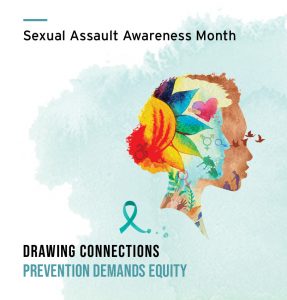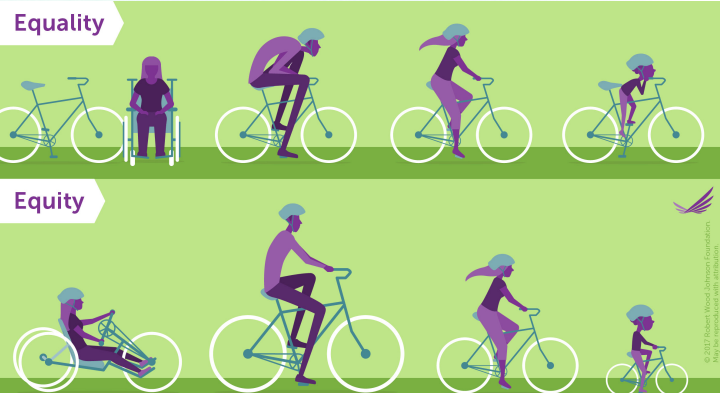SEXUAL ASSAULT AWARENESS MONTH
April is National Sexual Assault Awareness Month
Each April, the National Sexual Violence Resource Center promotes Sexual Assault Awareness Month (SAAM) to increase awareness and prevention of sexual assault, harassment, and abuse.
This year marks the 22nd anniversary of SAAM and focuses on “Drawing Connections, Prevention Demands Equity”.

Know the basics: Equity vs. Equality
Equality means giving everyone the same resources and opportunities. Equity takes social injustice into account. This helps us understand that individuals and communities have different needs based on lived experiences of oppression and/or privilege. Different needs call for different types or amounts of resources (National Resource Center on Domestic Violence [NRCDV] & National Sexual Violence Resource Center [NSVRC], 2021)
It is important to know the difference between these terms, equity and equality, and how they relate to each other because sometimes a solution for one person may not help someone else.
To illustrate this point, imagine if you wanted to increase bike riding in your community, so you gave every person a 10-speed bike. For some people, this is all they would need in order to go on a bike ride. But if we think about this through a lens of racial equity, we will understand that we would need to eliminate racial disparities so that everyone is able to go on a bike ride. Why would this be? Some communities have a history of racial injustice and are not safe places to ride bikes, because of poor road and traffic conditions or lack of ability to gather safely outside. Racial equity would mean changing the infrastructure of the community so that bike riding is safe both physically and socially.

For Youth
Young people play a critical role in replacing the harmful trends of yesterday with the new norms of respect today. It’s important to be aware of specific issues affecting youths as they continue their journey to becoming leaders of the future.
- Know your power. As a young person, you are in a unique position to provide your friends with useful information and perspective.
- Engage friends and build a network. You can encourage your friends to join you, ask for help from local and national organizations, and inspire others to get involved.
- Take a stand against oppression. Racism, sexism, classism, heterosexism, ageism, ableism, or other aspects of people’s identities can all be forms of oppression.


For Workplaces
Creating environments free from harm isn’t just a duty to undertake at home, it’s vital in every corner of our lives – the workplace included. Ending the silence on occupational harassment and violence begins when we feel safe to tell our stories and learn how to create equity, safety, and accountability in the workplace. Learn more.
For Parents


Raising tomorrow’s change-makers is no small task; especially in today’s environment of new risks and emerging technology. Parents need unique support in not only keeping their children safe but in ushering in a new era of trauma-informed nurturing.
- Talk to your children about racism and preventing sexual violence
- Help your child build autonomy with his/her own body
- Watch for signs that your child is being groomed (in person or online)
- Keep open channels of communication between you and your children
- Talk about race in age-appropriate ways
- Published: March 25, 2022
- Page reviewed/updated: April 27, 2023


